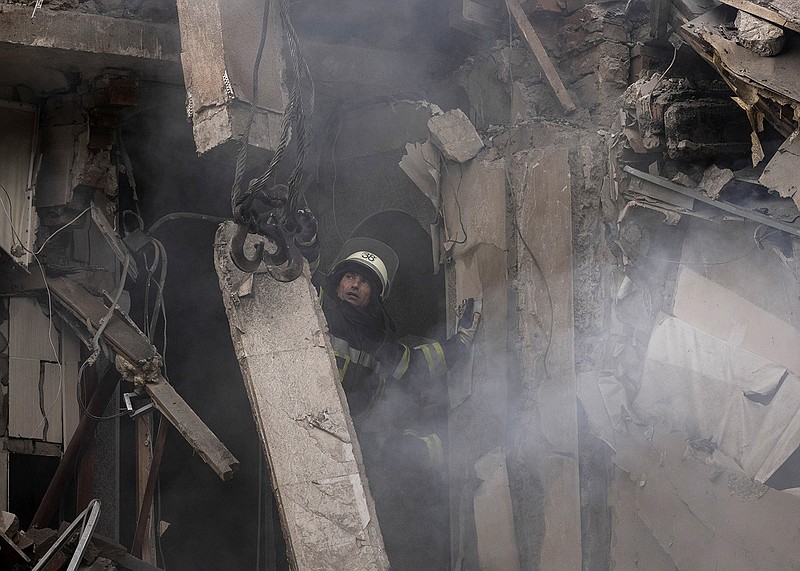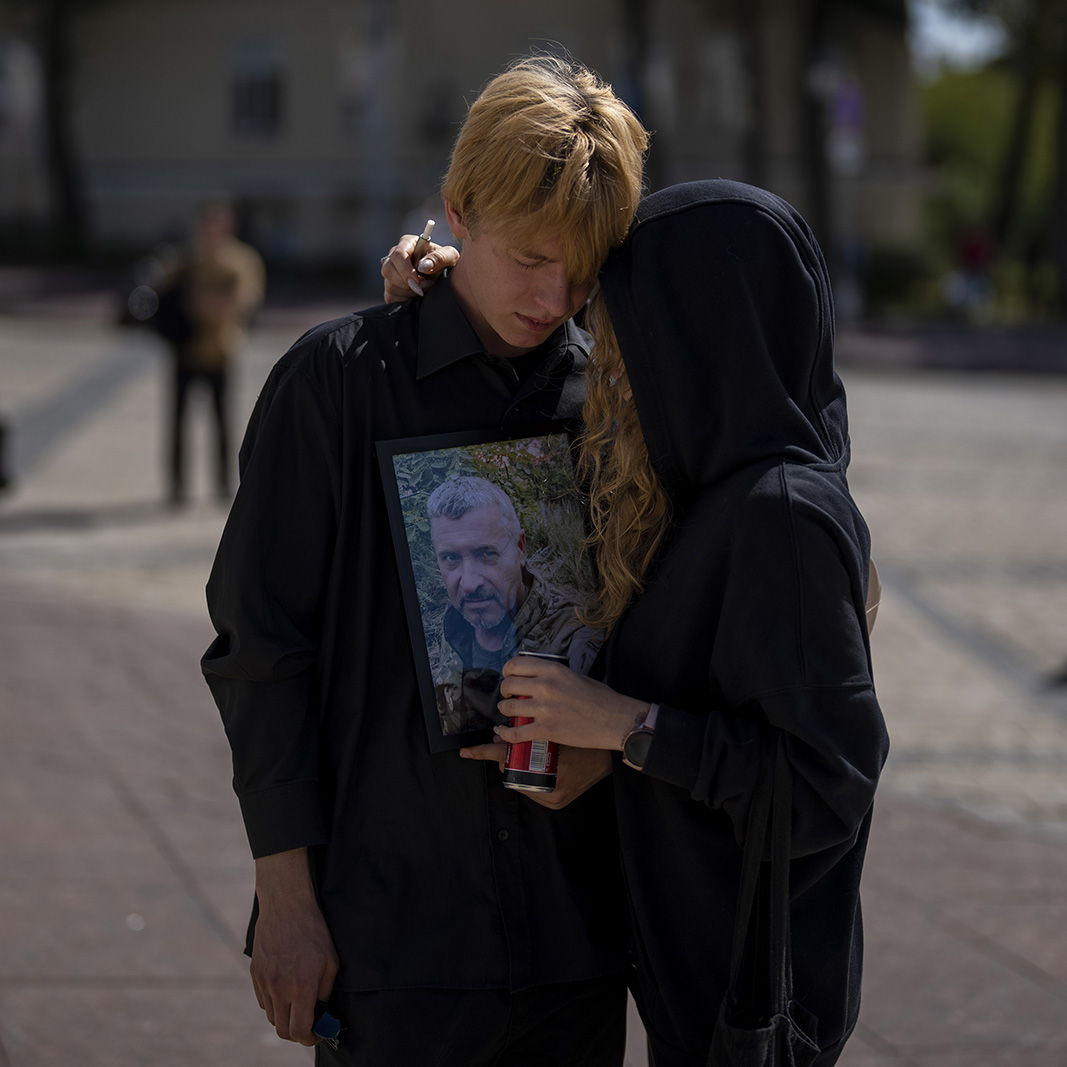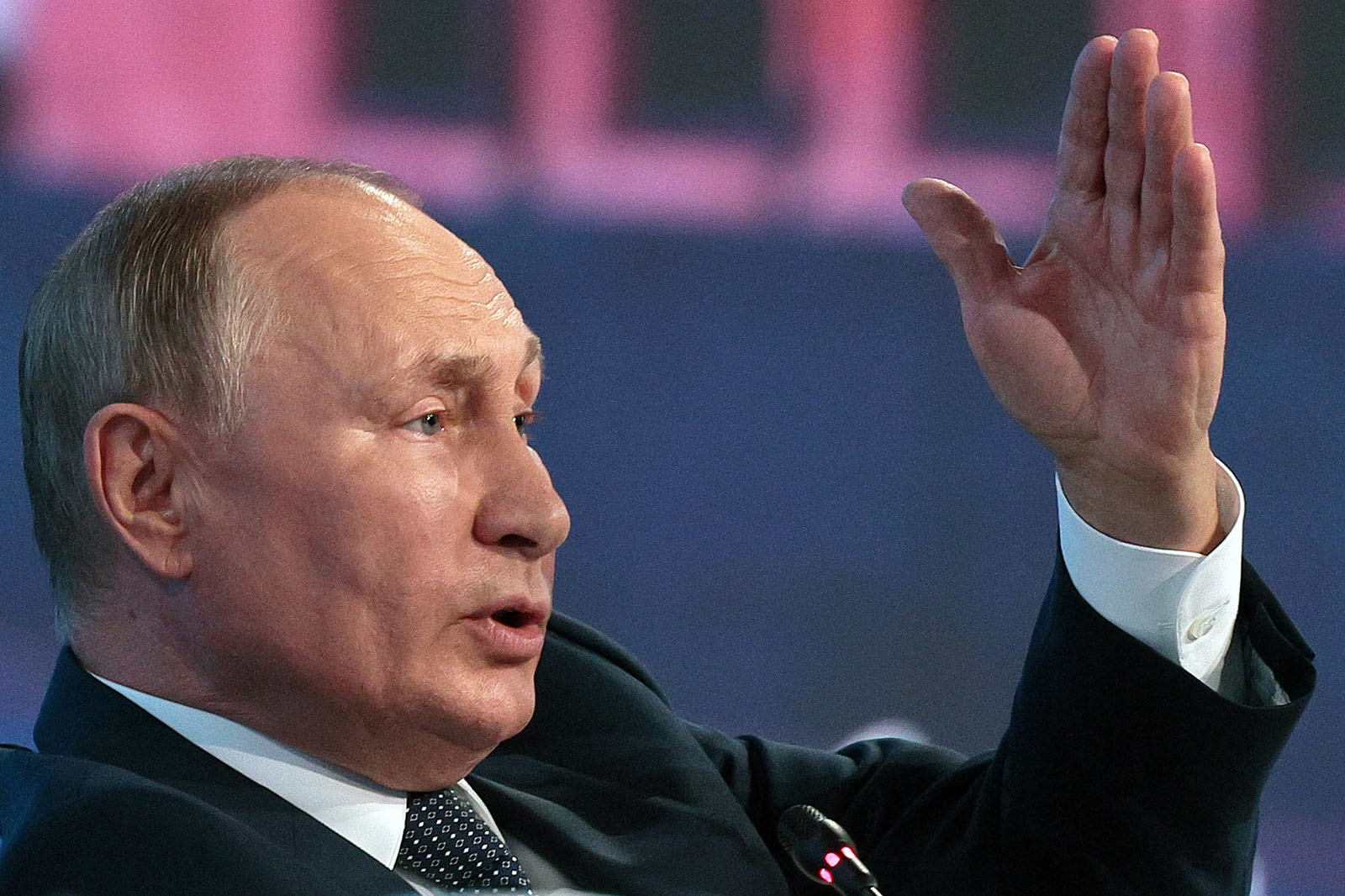As his forces struggle in Ukraine and his economy strains under sanctions, President Vladimir Putin of Russia struck a defiant tone Wednesday, arguing that the West had failed in its "economic, financial and technological aggression" against Russia and that his country had only gained from the global furor over his invasion.
"We have not lost anything and will not lose anything," Putin said at an economic conference in the far eastern Russian city of Vladivostok.
Putin's statement was dismissive of the human losses Russia has faced in the grueling campaign since he launched an invasion in February. His own Defense Ministry has acknowledged hundreds of deaths, although that total has not been updated in months. Western estimates are far higher: The United States estimated last month that 80,000 Russian soldiers had been killed or wounded in the war.
Putin also said he would meet next week with an increasingly important ally, President Xi Jinping of China, as the Russian leader tries to expand economic ties with Asia to counteract the effects of Western penalties. And he insisted that the invasion, now in its seventh month, had raised Moscow's international stature and that a crackdown on dissent was cleansing Russia of "harmful" elements, including journalists who have left the country since the conflict began.
"Of course, a certain polarization is taking place -- both in the world and within the country -- but I believe that this will only be beneficial," Putin said. "Because everything that is unnecessary, harmful and everything that prevents us from moving forward will be rejected."
He also reasserted his interpretation of the war in Ukraine as the culmination of efforts to subvert an unjust world order led by the United States, saying Western countries were "striving to maintain a former world order that is beneficial only to them."
Putin's remarks came as his forces face an increasingly difficult situation at the front lines in Ukraine, where they have been unable to capture a major town for more than two months. Ukraine is mounting a counteroffensive that its officials contend is showing initial signs of success.
"All of our actions aim to help people who live in Donbas," Putin said, referring to the region of eastern Ukraine that his forces have sought to conquer, vowing to fulfill this "duty to the end."
The Russian president sought to radiate confidence that the West's efforts to isolate Moscow were doomed to fail. Participating in an onstage panel with the leader of Burma and the prime minister of Mongolia, and with the third-highest-ranking member of the Chinese Communist Party, he indicated that Russia could shift its trade flows toward Asia.
"No matter how much someone wants to isolate Russia, it is impossible to do," Putin said. "You just need to look at the map."
Putin said Russia's currency and financial markets had been stabilized, inflation had been tamed and unemployment had been kept to "record lows." Yet his rosy pronouncements have been tempered by his own economic policymakers, who say it will take years for Russia's economy to rebound to prewar levels and that its growth will be hampered as long as Western sanctions are in place. Many analysts also predict further shocks as European countries press ahead with plans to sharply reduce purchases of Russian oil by the end of the year.
Putin used part of his speech to question a rare example of cooperation between Russia and Ukraine: a U.N.-brokered deal to allow the export of Ukrainian grain via the Black Sea.
He accused Western countries of "cheating" by diverting ships away from the world's poorest countries, offering no evidence for that claim. Putin said he would consult with President Recep Tayyip Erdogan of Turkey about amending the terms of the deal to limit the flow of grain to Western states.
U.S. officials called Putin's comments misleading, saying that huge amounts of grain were reaching needy countries outside Europe. Last week, a World Food Program ship carrying 23,300 metric tons of Ukrainian grain arrived in Djibouti, on the Horn of Africa, and a second ship carrying 37,000 metric tons departed for Yemen.
One senior U.S. official said Putin's remarks could be read as the Russian leader's latest effort to drive a wedge between Western countries and developing nations in the global south, potentially to create more pressure for an end to the fighting on terms favorable to Moscow.
NUCLEAR WAR
Ukraine's top military chief warned Wednesday that a "limited" nuclear war between Russia and the West cannot be discounted, a scenario with grave global implications.
"There is a direct threat of the use, under certain circumstances, of tactical nuclear weapons by the Russian Armed forces," commander in chief Valeriy Zaluzhnyi wrote in an article published by Ukrinform, a state-run media outlet. "It is also impossible to completely rule out the possibility of the direct involvement of the world's leading countries in a 'limited' nuclear conflict, in which the prospect of World War III is already directly visible."
Zaluzhnyi also acknowledged for the first time that Kyiv was behind strikes deep inside the Russian-occupied Crimea Peninsula in August. The air bases and ammunition depot that were hit were in areas previously thought to be out of range for Ukraine -- but were part of its strategy to shift "the Russian Army's center of gravity," Zaluzhnyi wrote.
With the fighting all but certain to continue into 2023, Ukraine has to make the war "even sharper and more tangible for the Russians and for other occupied regions, despite the massive distance to the targets," Zaluzhnyi wrote.
He called the Crimean strikes a "convincing example" of Kyiv's calls for allies to send longer-range weapons for its outgunned soldiers. Moscow, he said, can hit 20 times farther.
The military chief's assessment comes as Ukraine's armed forces claim to be recapturing small areas in counteroffensives in the country's south and east -- fighting that is taking a steep toll on Ukrainian soldiers, who are facing heavy losses against Russia's more advanced weapons and technologies.
Zaluzhnyi's warning follows weeks of international alarm over a potential disaster at Europe's largest nuclear facility, the Zaporizhzhia Nuclear Power Plant in southeastern Ukraine. Russian authorities control the plant, with more than 1,000 Ukrainian workers trying to keep it running and hooked up to their country's power grid despite frequent shelling.
The U.N. atomic watchdog agency on Tuesday called for a safe zone there to prevent a nuclear catastrophe. Ukrainian President Volodymyr Zelenskyy said he supported the idea if it meant Russian troops would leave. Both sides have accused the other of firing rockets and heavy artillery around the plant.
Zaluzhnyi said Russia's use of the plant as a military base showed its disregard for global nuclear safeguards "even in a conventional war."
Conditions at the plant have worsened. Because of damage to external power lines from the fighting, the plant is generating electricity only to power safety systems that keep the reactor cores cool and prevent them from melting down, a Ukrainian official said. Any further power disruption could force the plant to use back-up diesel generators, requiring four diesel fuel trucks a day to travel through the fighting, said Oleh Korikov, Ukraine's acting chief inspector for nuclear and radiation safety.
"We could potentially be in a situation where we run out of diesel," he said. "And this can lead to an accident with damage to the active zone of the reactors and, accordingly, the release of radioactive products into the environment."
The plant had to activate its diesel generators late last month, according to Ukrainian officials.
Authorities could consider shutting down the plant, Korikov said, without offering details.
WAR DEVELOPMENTS
Heavy fighting was reported on three fronts: in the north, near the city of Kharkiv; in the east, in the industrial Donbas region of mines and factories; and in the south, in the Kherson region, where Ukraine has mounted a counteroffensive to try to retake territory from the Russians.
Ukrainian forces have taken control of an unspecified number of towns in the Kherson region, military spokesperson Nataliya Humenyuk said. Zelenskyy, in his nightly video address, also reported success in the Kharkiv region, without providing details.
The Ukrainian military said it had foiled Russian attempts to advance on a dozen settlements in the east, including the city of Bakhmut, which the UK defense ministry has identified as "probably Russia's planned main effort." Capturing Bakhmut would enable Moscow's forces to threaten Sloviansk and Kramatorsk, the region's two largest Ukrainian-held cities.
Sloviansk came under Russian fire on Wednesday, and a school and another building were damaged, according to Mayor Vadym Lyakh.
Firefighters dug deep into the smoldering rubble of an apartment building and removed at least one body. Chunks of bricks, masonry and concrete lay among torn tree branches, broken glass and roof tiles. Metal doors, buckled by the blast's force, hung off their hinges.
The strike came about 4 a.m., said resident Raisa Smelkova, 75, who lives in another part of the building. She and her husband were unhurt. The couple lived through the fighting in Ukraine in 2014, when Russia annexed the Crimea region.
"What is happening now is not just scary, it's gruesome," she said. "There is more destruction. Everything is worse. Just everything."
In other developments:
• Andrei Turchak, the leader of United Russia, the main Kremlin-directed political party, suggested that referendums on joining the Russian Federation could be held in the eastern Donbas and other Russia-controlled areas in Ukraine on Nov. 4, when Russia marks National Unity Day. Russia has already recognized some parts of the Donbas as sovereign.
• The United States said Wednesday that it has evidence showing "hundreds of thousands" of Ukrainian citizens have been interrogated, detained and forcibly removed to Russia. Russia dismissed the allegation as "fantasy," calling it the latest invention in a Western disinformation campaign.
• The Russian military on Wednesday ended large-scale drills in the country's east that involved forces from China. It was seen as another show of increasingly close ties between Moscow and Beijing, contrasting with tensions with the West over the war.
Information for this article was contributed by Ivan Nechepurenko and Victoria Kim of The New York Times; Miriam Berger of The Washington Post; and Yuras Karmanau and Elena Becatoros of The Associated Press
Gallery: Images from Ukraine, month 7


